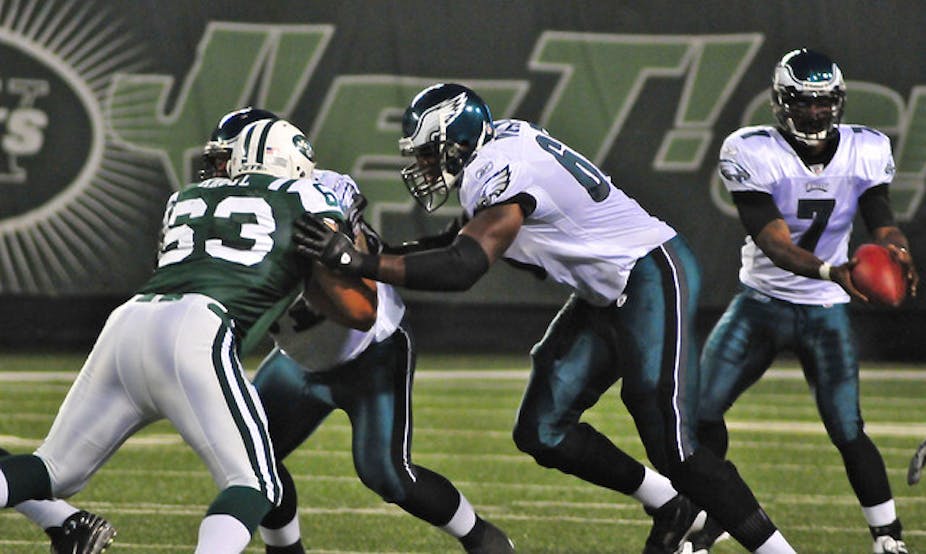A number of retired sports professional have claimed that mental health problems they developed later in life, such as depression and dementia, may have been caused by concussions sustained during their playing careers. Some of these players in the United States are now taking legal action against their former sporting governing bodies.
The recent media interest in concussion in American Football is driven by plaintiff lawyers and ignores much of the important scientific evidence available. The American lawyers claim that concussion causes long-term damage to the brain, and that the NFL has hidden this knowledge from the footballers for decades.
While we make no assertions on the merits of the legal proceedings in America, we can discuss the scientific issues, particularly in their application to football in Australia.
What is concussion?
Concussion is a type of mild brain injury in which there is temporary disruption of brain function, but no change in the structure of the brain. Concussion does not always include a loss of consciousness. Any of these symptoms may indicate a concussion: seizure or convulsion, amnesia, headache, neck pain, nausea or vomiting, dizziness, blurred vision, balance problems, sensitivity to light, difficulty concentrating, difficulty remembering, fatigue or low energy, confusion, or drowsiness.
For the player, an important aspect of concussion management is to recognise the symptoms and report the injury to the appropriate medical personnel. Management will include a period of rest to allow the brain to recover and a graded return to play.
Most people with concussion don’t need to undergo computed tomography (CT) or magnetic resonance imaging (MRI) scans of the brain. By definition, the CT and MRI scan of the brain is normal after concussion. CT is only required if a more serious brain injury or haemorrhage (bleed) is considered likely in the individual case.
In most cases of concussion, the symptoms and signs resolve quickly and fully (over seven to ten days), and there are no long-term effects.

However, in a very small number of people with concussion, the symptoms may persist for a longer period, sometimes weeks or months. Therefore, return to play guidelines have been developed that are based on recovery rather than arbitrary time periods. This means a doctor must not allow a player to return to sport until there has been complete neurological and cognitive recovery.
Premature return to play may place the player at increased risk of further injury. This risk may be due to persistent symptoms slowing the player’s reflexes, thus reducing their ability to avoid collisions.
Mental illness and concussion
Linking concussion with later onset of mental disease, such as depression and suicide is very complicated.
It has been shown that depression can occur in one out of every eight people in the community. Some of these people will also have had a sports concussion. But, did the concussion cause the depression, or was it going to develop in that individual anyway? There are many factors that contribute to the onset of depression, including genetics, chronic pain, illness, drugs and alcohol.
Some sports people with chronic injury (such as knee osteoarthritis or chronic back pain) will develop depression secondary to the chronic pain and disability of that injury. If they once had a concussion, some will want to blame the concussion as a cause for the depression. This is what the American lawyers are claiming in some of their cases.
There is no evidence that a single concussion results in the onset of depression in later life. There is some evidence that a history of three or more concussions may be associated with a slightly increased risk of depression. Such studies are limited by their retrospective nature, and inability to confirm the concussion injury or severity, and they do not exclude other variables such as drug and alcohol abuse.
A history of three mild concussions over ten years may be very different from a player who has three concussions per year. In the player sustaining multiple concussions per year, we need to carefully analyse the force of each head impact, the severity of symptoms and signs, the recovery time, and the interval between each concussion.
We are particularly concerned if there is a trend toward less impact force, increasing number of symptoms, prolonged symptom duration, and increasing frequency of concussion. In such a case we would likely remove that player from further participation in contact sport.
When we study the evidence linking concussion and depression, we look at the age of players at each concussion, the time taken to recover, the impact force required to produce the concussion, the time between concussions and the number and severity of concussions. We also look at the player’s medical history, use of alcohol, family history of depression, and the player’s drug use, including steroids, illicit and prescribed drugs.
People with particular genes, such as one called ApoE4 may have an increased risk of dementia following more severe forms of head injury. It is not known what effect there is in players with this gene who have concussion. It may be that this and other genes may be more important than a history of concussion when looking for risk factors for mental illness after football.
In Australia, there is close collaboration between the sports governing bodies and the expert medical community, with the welfare of players the prime concern. As such, local guidelines have been developed, and as new evidence arises, the guidelines will evolve to provide the safest playing environment possible.
Concussion is an inevitable consequence of contact sport; we can reduce its incidence with rule changes, and improve management and treatment with careful, evidence-based guidelines. Hysteria based on media hype serves no purpose.
We continue to perform detailed research into concussion and football, and the results of such research will ultimately answer many of these questions regarding the long-term effects of concussion.

